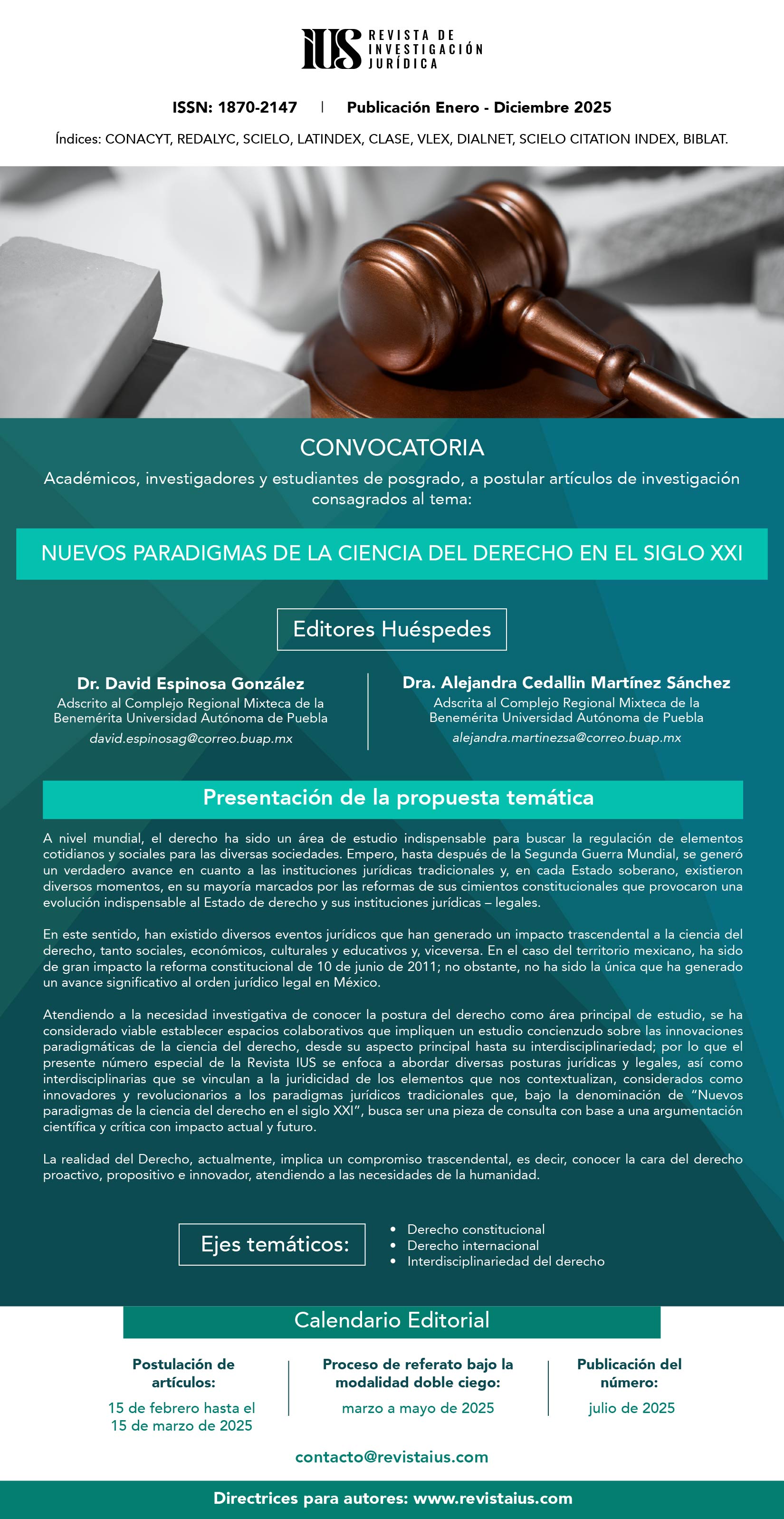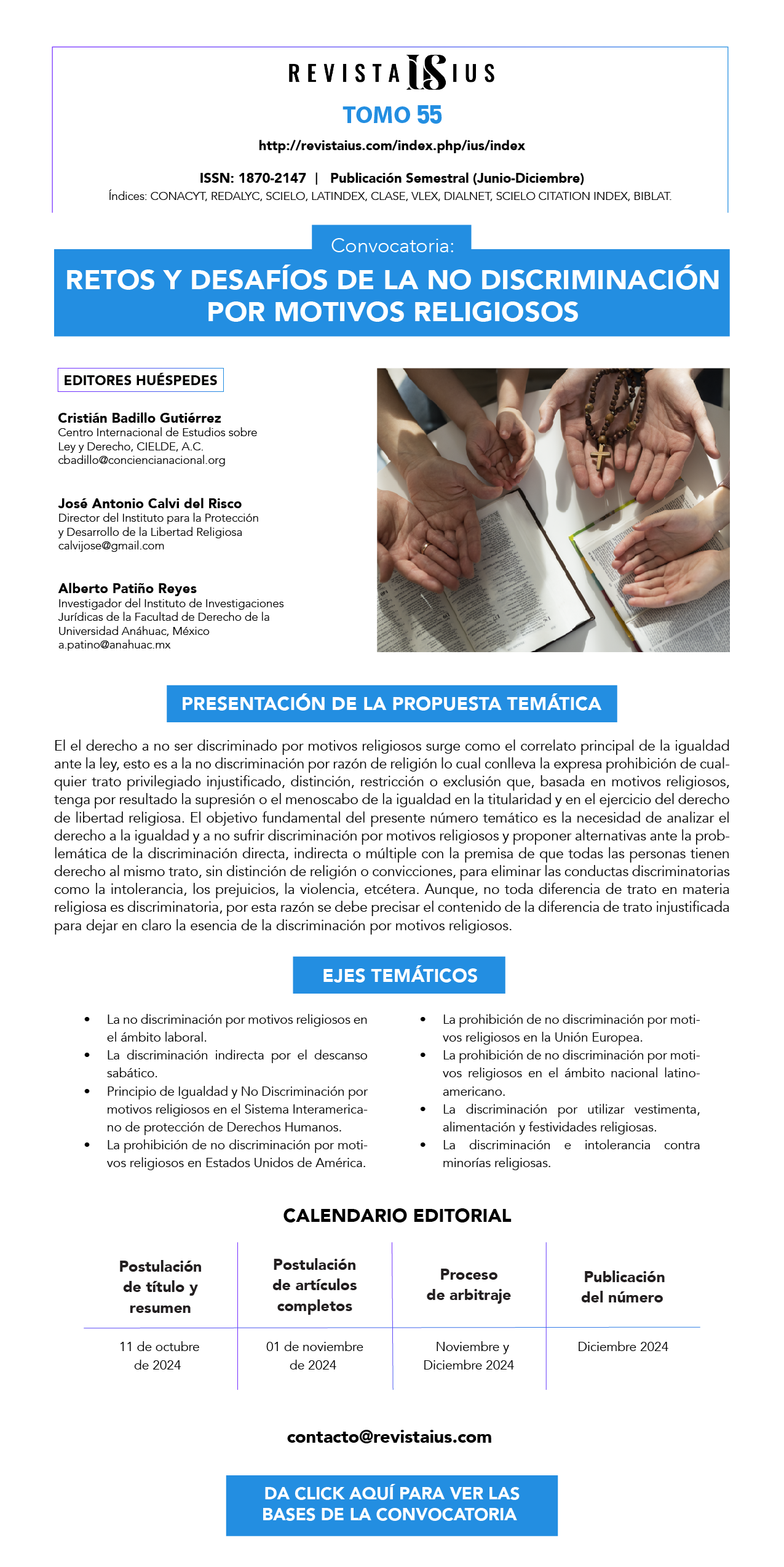Ciencia Ficción como Fuente de Principios Jurídicos para regular la Inteligencia Artificial
DOI:
https://doi.org/10.35487/rius.v15i48.2021.690Keywords:
Quehacer jurídico, Inteligencia Artificial, Ciencia Ficción, Filosofía de la Experiencia Jurídica, principios jurídicosAbstract
El quehacer jurídico cada día va evolucionando con la introducción de nuevas tecnologías en la vida diaria de las personas. Sin embargo, la Inteligencia Artificial (IA) se vislumbra no solo como un paso más en esta evolución, sino como una transformación total en la práctica diaria del jurista. Ante esta situación, el Derecho debe reevaluar sus prácticas, y sobre todo sus principios, para poder adecuarse a este cambio latente y con ello no quedar obsoleto o desactualizado. Aprovechando la corriente de la Filosofía de la Experiencia Jurídica, esta evolución jurídica puede analizarse por medio del estudio de algunas obras literarias y cinematográficas de Ciencia Ficción que sirvieron como base para presentar posibles dilemas teóricos sobre la tecnología -especialmente sobre IA- que, no obstante, son actuales o probables y que obligarán a limitar, incentivar, regir o corregir, desde el Derecho, todo aquello que afecte al ser humano y por ende su esfera jurídica.Downloads
References
OECD AI Conference Welcome Message [en línea]. En Going Digital. AI Intelligent machines, Smart policies. 26 octubre 2017 [fecha de consulta 20 diciembre 2019]. Disponible en: https://www.oecd.org/going-digital/ai-intelligent-machines-smart-policies/conference-agenda/
Asamblea General de las Naciones Unidas. Declaración Universal de los Derechos Humanos. 217 A (III) Francia, 10 diciembre 1948 [fecha de consulta 24 enero 2020]. Disponible en: https://www.un.org/es/universal-declaration-human-rights/
Asimov, Isaac. Asimov on Science Fiction. EUA, Harper Collins Publishers, 1983, ISBN 978-02-4612-0441
Asimov, Isaac. El círculo vicioso (Runaround – 1942). Inteligencia Educativa. Instituto de Formación Tecnológica. [fecha de consulta 4 febrero 2020]. Disponible en http://inteligenciaeducativa.net/descargas/runaround.pdf.
Borge, Iván Mateo. “La robótica y la inteligencia artificial en la prestación de servicios jurídicos” En Inteligencia Artificial, Tecnología y Derecho. España, Tirant Lo Blanch, 2017, ISBN 978-84-9169-720-6 p. 123-150
Buchanan, Bruce G. & Headrick, Thomas E. “Some speculation about artificial intelligence and legal reasoning” Stanford Law Review, Volumen 23 No. 1, año 1970, noviembre p. 40-62
Buchanan, Bruce G. “A (Very) brief history of Artificial Intelligence” AI Magazine, American Association for Artificial Intelligence (AAAI), Volumen 26, No. 4, año 2006, invierno 2005 p. 53-60
Casanovas, Pompeu “Inteligencia Artificial y Derecho: a vuelapluma” Teoría y derecho: revista de pensamiento jurídico. No. 7 año 2010 p. 203-222. Versión del autor disponible en Researchgate.net
Granfield, David. La experiencia interna del derecho. Un jurisprudencia de la subjetividad. México, Catholic University of Amercia/ Universidad Iberoamericana, 1996, ISBN 968-859-228-5
Jordan, Philipp; Mubin, Omar; Obaid, Mohammad & Sila, Paula A. Exploring the referral and Usage of Science-Fiction in HCI Literature. En Marcus, Aaron & Wang, Wentao (Eds.) Design, user experience, and usability: Designing Intearctions, Tomo II, EUA, Springer, ISBN 978-3-319-91802-0 p. 19-38 Versión del autor disponible en Researchgate.net
Krausova, Alzbeta. “Intersections between Law and Artificial Intelligence” International Journal of Computer (IJC) Volumen 27, No. 1 año 2017, p. 55-68. Versión del autor disponible en Researchgate.net
Llano Alonso, Fernando H. El formalismo jurídico y la Teoría Experiencial del Derecho. España. Tirant Lo Blanch, 2009 ISBN 978-84-9985-511-0
Vigo, Rodolfo L. “Los principios jurídicos y su impacto en la teoría actual.” En Vigo, Rodolfo L. La interpretación (argumentación) jurídica en el Estado de Derecho Constitucional. México, Tirant Lo Blanch, 2017, ISBN 978-84-9169-616-2
Vigo, Rodolfo L. Interpretación Jurídica: del modelo iuspositivista legalista decimonónico a las nuevas perspectivas. Argentina. Rubinzal. 1999, ISBN 978-950-727-197-7
Downloads
Published
Issue
Section
License
Revista IUS, published by the Legal Sciences Institute of Puebla A.C., is distributed under the Creative Commons Attribution-NonCommercial 4.0 International (CC BY-NC 4.0) license.
We authorize collaborators to upload a copy of their published work on their personal websites or any Open Access repository, provided that Revista IUS is specifically cited as the original source, indicating the year and issue of the respective example and adding the link to the webpage on which this publication can be freely consulted in toto and without charge: http://www.revistaius.com
Readers are free to:
Share, copy and redistribute the material via any medium or format.
The licensor cannot revoke these freedoms as long as you follow the license terms.
Under the following terms:
Attribution: You must give appropriate credit, provide a link to the license, and indicate if changes were made.
You may do so in any reasonable manner, but not in any way that suggests the licensor endorses you or your use.
NonCommercial – You may not use the material for commercial purposes.
If you remix, transform or build upon the licensed material, its distribution is not permitted.
Charges for managing articles: Revista IUS will not charge for receiving, processing or publishing articles (Article Processing Charge, or APC) submitted by authors.





